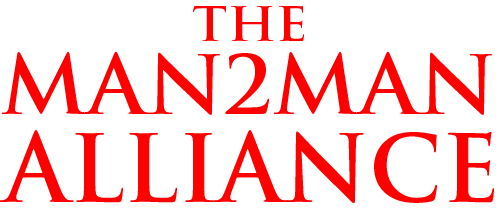




The Passing of Tarzan
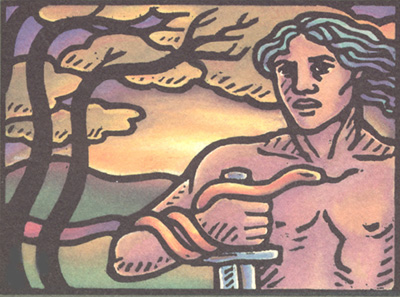


The Passing of Tarzan
5-24-2007
I was saddened by the news that on April 30, 2007, actor Gordon Scott passed away at the age of 80. He was my generation's TARZAN, having made 6 Tarzan films. In his loincloth, on the widescreen and in technicolor, he was for me the embodiment of the Man of the Jungle. Like Enkidu, he was master of the animals and contended with the men of civilization.
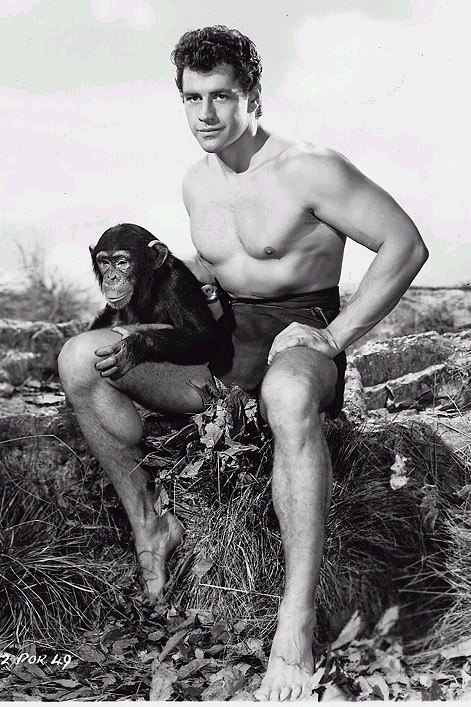
Standing 6' 2", 240 pounds of muscle, Mr. Scott was, in true Hollywood cliche form, noticed by a talent scout at his job as a lifeguard at the pool of the Sahara Hotel in Las Vegas. He had served in the Army as a Drill Sergeant from 1944-1947. Before becoming a lifeguard he had also been a judo instructor and truck driver. For me he exemplified those positive manly virtues that I feel are lacking in the screen 'heroes' of today. While his personal life didn't always mirror his on screen character, I'm sure that his many fans, like myself, will miss him. His last years were spent living in the home of a devoted fan and his wife.
Re: The Passing of Tarzan
5-26-2007
Thank you Danny.
Danny makes reference to Enkidu.
Enkidu was Gilgamesh's lover.
I saw an AP obit in the NY Times when Scott died.
The Times has since restricted access to it.
However, since there was a quote in there from Burroughs' grandson which I wanted, I looked on the web and found it in an Indian paper, The Hindu.
Here's a bit of their obit:
Burroughs' hero is handsome, with clean cut features, well built and athletic. All the screen Tarzans possessed these qualities, but Scott was particularly handsome. Some of his well-known roles were in 'Tarzan and the Lost Safari,' 'Tarzan and the Trappers,' 'Tarzan's Greatest Adventure' and 'Tarzan the Magnificent.'
...
Scott deservingly got kudos from Danton Burroughs, grandson of the creator of Tarzan. "He was an absolutely wonderful Tarzan who played the character as an intelligent and nice man and who carried himself well, much as my grandfather had originally written the role."
So the author of the obit in The Hindu says that Scott deserved the praise he received from Danton Burroughs -- who in turn says that Scott well fit the role of Tarzan as originally conceived by Edgar Rice Burroughs.
While Danny says that as Tarzan, Scott exemplified the "positive manly virtues"; and that like Enkidu, he "contended with the men of civilization."
Now: some of you may feel, by the end of this reply, that at least I, if not Danny, is putting far too much weight on this figure from pop culture.
But -- I've seen some of the movies, and I agree with Danny and Danton Burroughs.
Scott does indeed possess, at least in the role, "the positive manly virtues."
And I have to say that Scott's manliness -- his manly virtue, his valour -- makes him very hot in the role.
It's not just his looks -- it's the way he carries himself, the way he comports himself.
In that respect, his pix don't do him justice -- you need to see him in action.
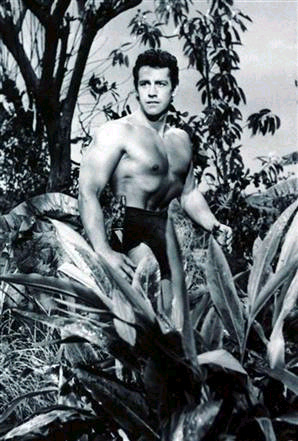
He's masculine, he's manly, he's virile -- and he doesn't need clothes.
He's *naturally* masculine.
It's interesting in that respect that he trained in judo, and that he served during WW II.
In one of the movies Scott has a truly brutal fight with the villain -- and he's really good -- as befits a judoka, his physical moves are right on;
but beyond that, he's incredibly intense in the fight.
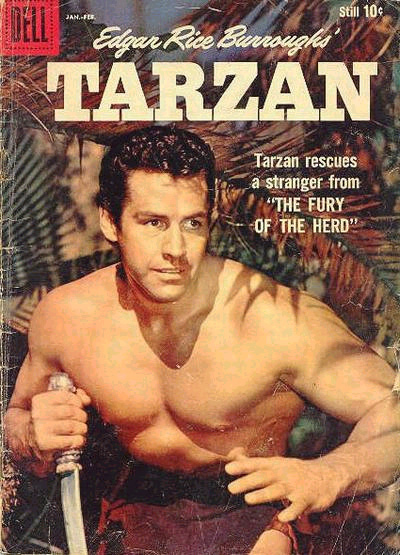
Now, when I looked online for these pix, I discovered that not only had Scott done Tarzan, but he'd done a bunch of sword and sandal flix.
Including this one with Steve Reeves:
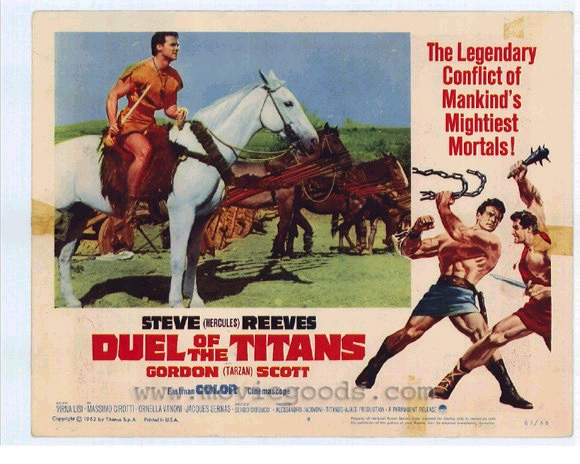
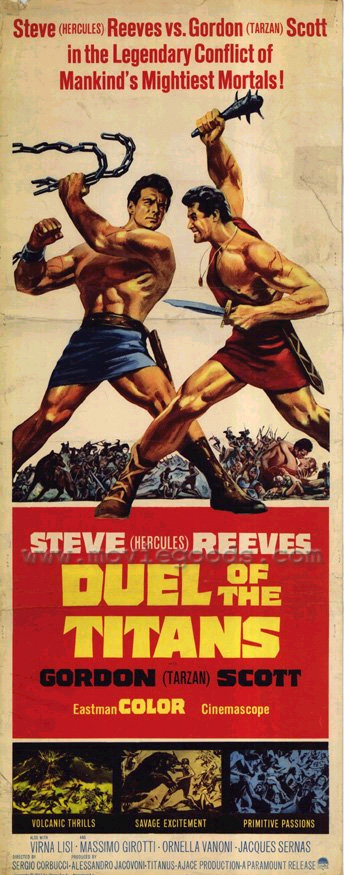
I haven't seen this movie, but my guess is that in the movie, Reeves portrayed Hercules and Scott -- Samson.
Because these are two well-known "strongmen" in pop culture.
But this one really surprised me:
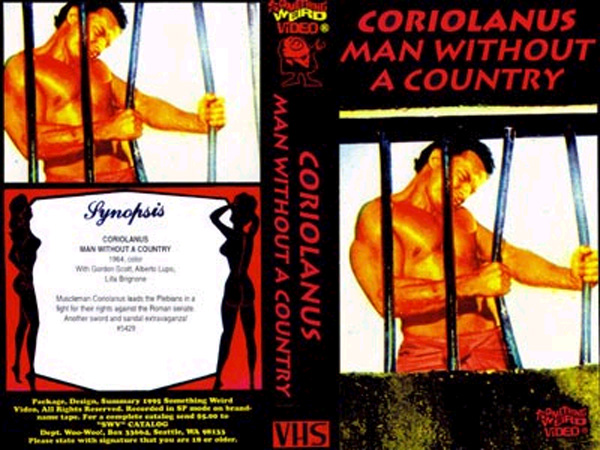
Muscleman Coriolanus leads the Plebians in a fight for their rights against the Roman senate. Another sword and sandal extravaganza!
Like I say, this one surprised me, because Coriolanus, an ancient Roman hero whose life story was preserved by Plutarch -- and then made into a play -- a tragedy -- by Shakespeare -- is NOT well known.
At least not in our culture.
Maybe he is in Italy.
But not worldwide the way Hercules is.
Now, the blurb says that "Muscleman Coriolanus leads the Plebians in a fight for their rights against the Roman senate."
Actually, that's not what happens in Coriolanus.
Coriolanus is a Warrior of the Patrician class -- who's betrayed by both the Patrician and Plebian parties.
But I can see where the screenwriters were coming from.
And it's really interesting that they -- or whomever -- chose Gordon Scott to play Coriolanus.
Because Coriolanus, like Tarzan, is a fearsome fighter and a naturally masculine man.
Who however, and unlike Tarzan, is done in by politics -- in this case, the politics of ancient Rome.
Now of course the movie may be -- and probably is -- awful.
But when I saw the photo, I was really struck by the idea of Gordon Scott -- aka Tarzan -- as Coriolanus.
Because again, and to use Danny's phrase, these are two mythic men who exemplify the manly virtues.
And who "contend with the men of civilization."
Put in our terms, both Tarzan and Coriolanus are naturally masculine men faced with males who follow the norms of pseudo-masculinity.
Males who, as a consequence of their pseudo-masculinity, behave "dishonorably" -- in ways that betray themselves and their fellow Men.
And let me refer here to the end of the 300/Sparta message thread, where I quote from some of the Sayings of the Spartans.
In several, the Spartans disdain the Persian love of luxury.
In one of Scott's Tarzan movies, he's fighting some villains who've come to seize a diamond mine.
So it's the same deal.
Tarzan, like the Spartans, lives an austere life in which he doesn't need to steal -- or exploit nature -- to survive and be happy.
The diamond thieves are like Xerxes:
They're not Free Men; rather, they're enslaved by the norms of pseudo-masculinity, which lead them down a false and ultimately fatal path.
Here's Leonidas to Xerxes:
If you understood what is honorable in life, you would avoid lusting after what belongs to others. For me, it is better to die for Greece, than to be monarch of the people of my race.
Again, it's the same idea.
The honorable Man -- the naturally masculine man -- doesn't steal, doesn't need empty luxuries, nor phoney offices.
And in his movies Scott expresses those honorable virtues of Natural Masculinity.
So: Gordon Scott, for whatever reason, was someone who was really good at portraying archetypal, mythic, Masculine Heroes.
Warriors.
The archetypal Man.
Now, some time ago, I had planned on talking about Coriolanus in an entirely separate message thread;
but instead I'm adding what I'd written to this thread -- because there's something really interesting going on here.
The 1950s was an era of intense heterosexualization.
Gordon Scott was, by the standards of the day, merely a minor and musclebound movie star.
And not really a star.
But because he was minor and musclebound and a martial artist and thus essentially fringe -- like Steve Reeves -- he ended up playing a number of very archetypal Masculine, Man2Man heroes.
As you'll see.
Because as with Statius and his Greek heroes, there's a strong -- to put it mildly -- Man2Man, Manhood2Manhood element to the story of Coriolanus.
Which Shakespeare makes explicit.
Now -- in a super-heterosexualized society, if Gordon Scott had been someone like Paul Newman, let's say, he probably couldn't have gotten away with doing either Tarzan or Coriolanus.
But in an age when superheroes are thought fit only for adolescents, he managed to do both.
He may have died poor and obscure in Baltimore.
But he had some really great roles.
Masculine roles.
Man2Man roles.
Let's take a closer look at Shakespeare's Coriolanus -- and you'll see what I mean.
The original Coriolanus was a (more than likely) mythical Roman hero, whose biography was recorded by Plutarch in his Lives of the Noble Grecians and Romans;
which in turn was made into play by none other than Shakespeare.
Now in the original, Coriolanus is indeed a man without a country.
But that's not because he's taken the side of the Plebians.
Far from it.
Coriolanus is the greatest Roman general of his day, a general who like Alexander fearlessly leads his men into battle -- but he's a Patrician.
And he gets caught up in a dispute between the Patricians and the Plebians over debt relief.
As a consequence he's exiled.
And he goes over to Rome's enemy, the Volsces.
In this scene, Coriolanus has been thrown out of Rome, and has shown up at the house of his leading enemy, Aufidius of the Volsces.
Aufidius is not simply another general.
He's a man whom Coriolanus has fought many times in single combat.
And failed to kill.
CORIOLANUS
My name is Caius Marcius, who hath done
To thee particularly and to all the Volsces
Great hurt and mischief; thereto witness may
My surname, Coriolanus: the painful service,
The extreme dangers and the drops of blood
Shed for my thankless country are requited
But with that surname; a good memory,
And witness of the malice and displeasure
Which thou shouldst bear me: only that name remains;
The cruelty and envy of the people,
Permitted by our dastard nobles, who
Have all forsook me, hath devour'd the rest;
And suffer'd me by the voice of slaves to be
Whoop'd out of Rome. Now this extremity
Hath brought me to thy hearth; not out of hope--
Mistake me not--to save my life, for if
I had fear'd death, of all the men i' the world
I would have 'voided thee, but in mere spite,
To be full quit of those my banishers,
Stand I before thee here. Then if thou hast
A heart of wreak in thee, that wilt revenge
Thine own particular wrongs and stop those maims
Of shame seen through thy country, speed thee straight,
And make my misery serve thy turn: so use it
That my revengeful services may prove
As benefits to thee, for I will fight
Against my canker'd country with the spleen
Of all the under fiends. But if so be
Thou darest not this and that to prove more fortunes
Thou'rt tired, then, in a word, I also am
Longer to live most weary, and present
My throat to thee and to thy ancient malice;
Which not to cut would show thee but a fool,
Since I have ever follow'd thee with hate,
Drawn tuns of blood out of thy country's breast,
And cannot live but to thy shame, unless
It be to do thee service.
So -- and I'm going to recap a bit, but please bear with me:
Coriolanus is a tragedy by Shakespeare, which follows very closely the telling of the Coriolanus story by Plutarch.
And, by the way, you can find both the Plutarch in the Dryden translation, and the play itself, on the web.
No need to even buy a book.
Plutarch wrote ca 100 AD in Greek for a bilingual Roman audience.
Not many Europeans spoke Greek in the Middle Ages, and much of what we have from the Greeks was preserved by the Arabs.
But, during the Renaissance, Plutarch was translated from Greek to French, and then from French to English.
And Shakespeare, writing ca 1600, relied heavily on that translation for a number of his plays about Greece and Rome -- plays like Julius Caesar.
Now: Caius Marcius Coriolanus was a mythical Roman hero -- so he dates way back and personifies the old Roman masculine and manly virtues.
In both Plutarch and Shakespeare, Coriolanus, though a fearsome warrior of great personal integrity and unquestioned bravery, who has won many battles for Rome, is banished because he falls foul of the Plebian party which is in conflict with the Patricians over debt relief.
So he's basically caught up in a political squabble -- for which, being a soldier and blunt by nature, he's ill-suited.
Having been banished, he turns to Rome's most recent enemy, the Volsces, and goes to the house of their leading warrior, Aufidius, with whom he's fought many times in single combat.
As you just read, he tells his enemy what's happened, and that he now wishes to fight at his side against Rome.
This is the response:
AUFIDIUS
O Marcius, Marcius!
Each word thou hast spoke hath weeded from my heart
A root of ancient envy. If Jupiter
Should from yond cloud speak divine things,
And say 'Tis true,' I'ld not believe them more
Than thee, all noble Marcius. Let me twine
Mine arms about that body, where against
My grained ash an hundred times hath broke
And scarr'd the moon with splinters: here I clip
The anvil of my sword, and do contest
As hotly and as nobly with thy love
As ever in ambitious strength I did
Contend against thy valour. Know thou first,
I loved the maid I married; never man
Sigh'd truer breath; but that I see thee here,
Thou noble thing! more dances my rapt heart
Than when I first my wedded mistress saw
Bestride my threshold. Why, thou Mars! I tell thee,
We have a power on foot; and I had purpose
Once more to hew thy target from thy brawn,
Or lose mine arm fort: thou hast beat me out
Twelve several times, and I have nightly since
Dreamt of encounters 'twixt thyself and me;
We have been down together in my sleep,
Unbuckling helms, fisting each other's throat,
And waked half dead with nothing.
So this is what we hear:
First Aufidius hugs him, and says
[I] do contest
As hotly and as nobly with thy love
As ever in ambitious strength I did
Contend against thy valour.
So he makes an explicit comparison between love and war: I find your love as "hot" as I did fighting you.
And notice that word "valour."
There it is again, the old Roman Virtus, and as in Statius' his valour plain to see, it has multiple meanings.
"Contend against thy valour"
Valour against Valour
Courage against Courage
Prowess against Prowess
Manhood against Manhood
Then Aufidius says,
Know thou first,
I loved the maid I married; never man
Sigh'd truer breath; but that I see thee here,
Thou noble thing! more dances my rapt heart
Than when I first my wedded mistress saw
Bestride my threshold.
Translation: Coriolanus' presence in his home is more exciting to him than his wedding night.
And it gets better:
Why, thou Mars! I tell thee,
We have a power on foot; and I had purpose
Once more to hew thy target from thy brawn,
Or lose mine arm fort: thou hast beat me out
Twelve several times, and I have nightly since
Dreamt of encounters 'twixt thyself and me;
We have been down together in my sleep,
Unbuckling helms, fisting each other's throat,
And waked half dead with nothing.
Let's play that again:
and I have nightly since
Dreamt of encounters 'twixt thyself and me;
We have been down together in my sleep,
Unbuckling helms, fisting each other's throat,
And waked half dead with nothing.
Translation: Every night since we've fought, I've dreamt of fighting you; we've been together in my sleep, wrestling on the ground, taking off helmets, and fisting each other's throat -- and then waked half dead with nothing.
What's striking of course are all the sexual references Shakespeare gives Aufidius.
Those references aren't in Plutarch.
In Plutarch, Aufidius just makes a polite if enthusiastic reply.
But Shakespeare has a different idea.
He recognizes that at least one of these men has gone through a passage -- a passage through rage to love.
He knows that the feelings and erotic energies of MEN at war -- whether friends or foes -- are volatile, and can turn quickly.
And that's what Aufidius says, at least, has happened.
He's gone from hate to love.
And Shakespeare has given him a speech which makes an unabashed connection between sex -- m2m sex -- and aggression.
Something which Gordon Scott no doubt knew something about.
What would have been hot -- would have been to see Gordon Scott as Coriolanus.
And Steve Reeves as Aufidius.
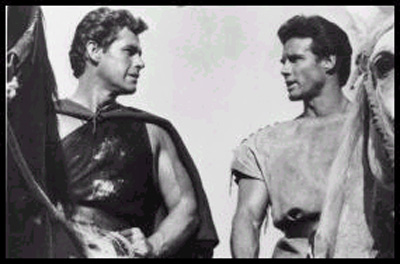
Now, of course, I'm having some fun with this, but with a serious purpose.
Who'd thunk it after all?
Gordon Scott, a Tarzan, playing one of Shakespeare's tragic heroes.
But Coriolanus, you see, isn't Hamlet.
Hamlet vacillates.
Not Coriolanus.
His tragedy is that he's blunt and honest; he won't curb his tongue to please the Roman mob.
So that the abilities which have served him so well as a Warrior; get him into trouble when his erstwhile friends put him forward for political office.
One could argue -- and some certainly have -- that Hamlet is to some degree lacking in manliness.
But one would never say that about Coriolanus.
It's his manliness which has made Coriolanus a Roman hero.
And it's his manliness which gets him into trouble.
Because it brings him into conflict with, as Danny said, the men of civilization.
Unfortunately, Coriolanus has no jungle to which he can escape and where he can -- justly -- rule.
Instead he's caught between the scheming Romans and the Volsces -- who turn out, in the person of Aufidius, to be equally devious.
As a kid, I couldn't relate to mainstream male moviestars.
They were too thoroughly heterosexualized.
Put differently -- they were too compromised.
Men like Gordon Scott -- and Steve Reeves -- spoke to me.
Because, as Danny said, they had the "positive manly virtues."
They were, to the extent their culture allowed, Naturally Masculine.
They were MEN.
Danny, thank you again.
Bill Weintraub
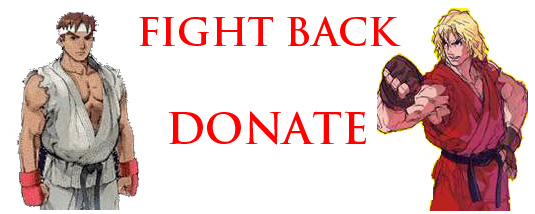
© All material Copyright 2007 by Bill Weintraub. All rights reserved.
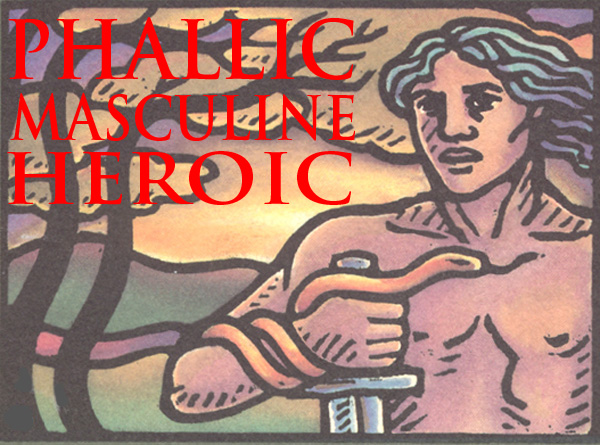



AND


Warriors Speak is presented by The Man2Man Alliance, an organization of men into Frot
To learn more about Frot, ck out What's Hot About Frot
Or visit our FAQs page.

| Heroes Site Guide | Toward a New Concept of M2M | What Sex Is |In Search of an Heroic Friend | Masculinity and Spirit |
| Jocks and Cocks | Gilgamesh | The Greeks | Hoplites! | The Warrior Bond | Nude Combat | Phallic, Masculine, Heroic | Reading |
| Heroic Homosex Home | Cockrub Warriors Home | Heroes Home | Story of Bill and Brett Home | Frot Club Home |
| Definitions | FAQs | Join Us | Contact Us | Tell Your Story |

© All material on this site Copyright 2001 - 2010 by Bill Weintraub. All rights reserved.
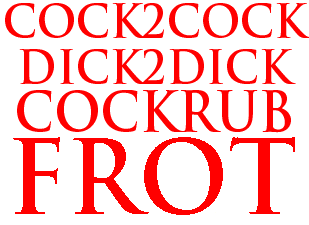

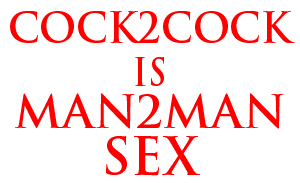
Guys -- while I was working on this reply, I was also writing up the post I called .
And what you need to recognize is that the behavior of fictional characters like Tarzan and Coriolanus aren't plucked from the air;
their behavior is based on the behavior of Warriors.
True Warriors -- Men who've been properly socialized into the uses of aggression.
And who aren't afraid of their natural male attraction.

